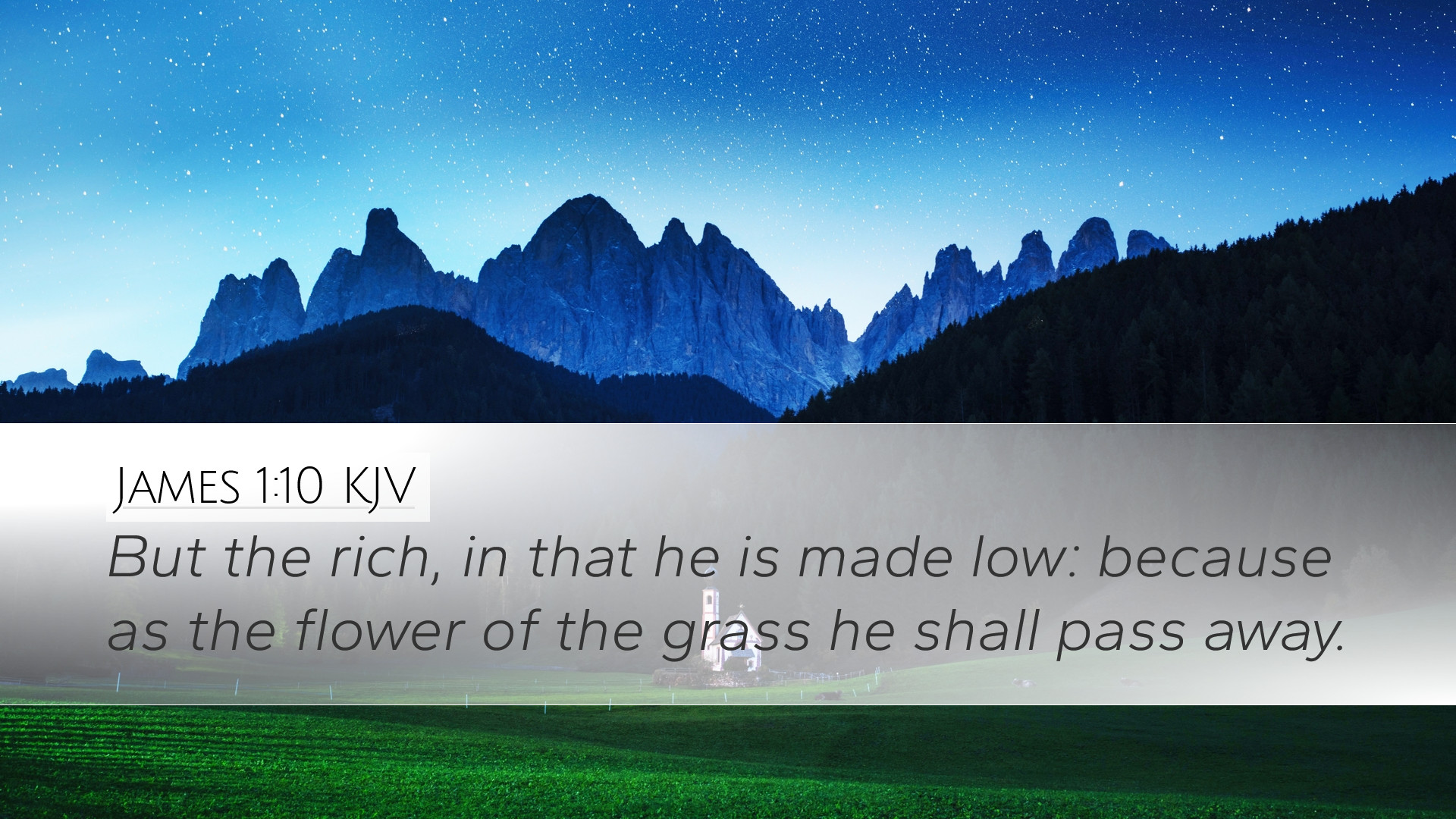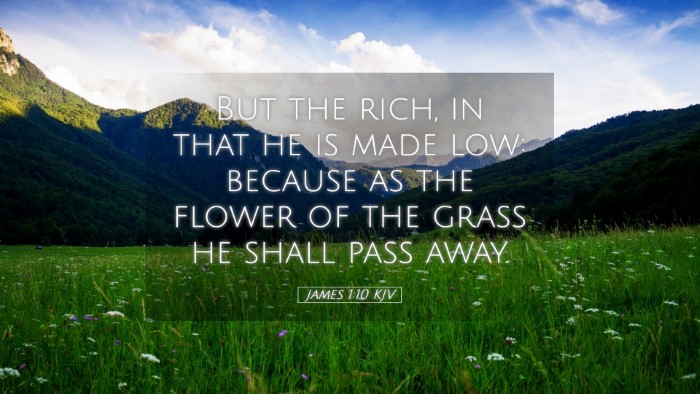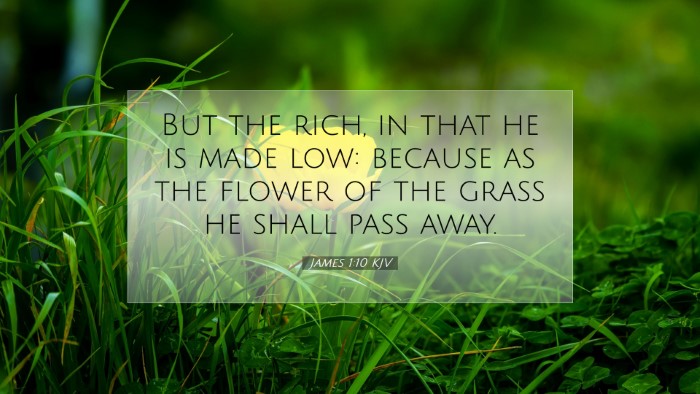Old Testament
Genesis Exodus Leviticus Numbers Deuteronomy Joshua Judges Ruth 1 Samuel 2 Samuel 1 Kings 2 Kings 1 Chronicles 2 Chronicles Ezra Nehemiah Esther Job Psalms Proverbs Ecclesiastes Song of Solomon Isaiah Jeremiah Lamentations Ezekiel Daniel Hosea Joel Amos Obadiah Jonah Micah Nahum Habakkuk Zephaniah Haggai Zechariah MalachiJames 1:10
James 1:10 KJV
But the rich, in that he is made low: because as the flower of the grass he shall pass away.
James 1:10 Bible Commentary
Commentary on James 1:10
Verse Reference: James 1:10 - "But the rich, in that he is made low: because as the flower of the grass he shall pass away."
Introduction
This verse offers profound insights into the transient nature of material wealth and the equality of man before God. The apostle James highlights the precarious position of the rich, presenting a stark reminder of the temporal nature of physical beauty and financial prosperity.
Exegesis and Key Themes
- Wealth and Humility: James contrasts the rich with the lowly, emphasizing the spiritual danger that material wealth can pose. As Matthew Henry articulates, wealth can lead to pride and forgetfulness of God, and the rich must come to recognize their need for humility and dependence on divine grace.
- The Fleeting Nature of Riches: The analogy of "the flower of the grass" underscores the brevity of life and the transitory nature of earthly possessions. Adam Clarke expounds on this imagery, noting that just as grass withers and flowers fade, so too do the fortunes of the wealthy, reminding readers of the inevitable decline that accompanies life.
- Divine Perspective: The rich are reminded of their need to be humbled, for their wealth will not endure. Albert Barnes notes that God's perspective on wealth is radically different from the world's, where riches often confer status; in the divine economy, humility is honored above material success.
Insights from Public Domain Commentaries
In the following sections, we explore insights from notable public domain commentaries on this verse:
Matthew Henry's Commentary
Matthew Henry observes that the rich often find themselves in a precarious position concerning their spiritual life. He highlights that though they may be elevated in society, they are frequently spiritually impoverished. Their wealth can serve as an obstacle rather than a blessing, potentially leading to a false sense of security. Henry insists that while wealth itself is not evil, the heart's attachment to it can lead one away from the way of life that God intended. He warns that in times of trial, the rich can easily despair if they are relying solely on their riches instead of on God.
Albert Barnes' Notes on the Bible
Albert Barnes elaborates on the statement "he is made low," suggesting that trials can bring down the high-minded and remind them of their mortality. He emphasizes that the rich must understand that wealth is only a temporary advantage and that God’s favor is what truly matters. Barnes highlights the paradox that those who seem to have everything may ultimately find themselves lacking without spiritual wealth.
Adam Clarke's Commentary
Adam Clarke brings a scholarly perspective, detailing the cultural context of wealth in the early church. His analysis suggests that James is addressing a community that observed the oppression of the poor by the wealthy. Clarke connects the imagery used in James 1:10 with Isaiah 40:6-8, reinforcing the message that the glory of man is fleeting. He calls for the rich to remember that their financial standing does not elevate them in God’s eyes and urges them to focus on eternal values.
Theological Implications
- The Concept of 'Memento Mori': This passage evokes the sentiment of 'remember that you must die,' reminding believers that earthly wealth is perishable.
- Wealth as a Test: Theology surrounding wealth as a test of faith underscores that the richness of a person is ultimately defined by their relationship with God rather than their material possessions.
- Call to Altered Priorities: Pastors and theologians may emphasize the call for changed priorities, encouraging congregants to invest in spiritual wealth, characterized by service, generosity, and love.
Practical Applications
- Encouragement to the Affluent: This verse can serve as a sobering reminder for wealthier congregants about their spiritual responsibilities and the need for humility.
- Teaching Moment for Discipleship: Encouraging discussions on the stewardship of resources illustrates that true wealth lies in generosity and service to others.
- Building a Culture of Care: Promoting a church culture that prioritizes the needs of the poor and marginalized echoes the heart of this scripture, fostering empathy and community support.
Conclusion
James 1:10 stands as a poignant reminder of the fleeting nature of earthly wealth. The commentaries of Matthew Henry, Albert Barnes, and Adam Clarke provide rich insights that help us grasp the spiritual importance of humility and reliance on God. As pastors, students, theologians, and scholars reflect on this passage, may we strive to apply its teachings in both our personal lives and communal interactions.


